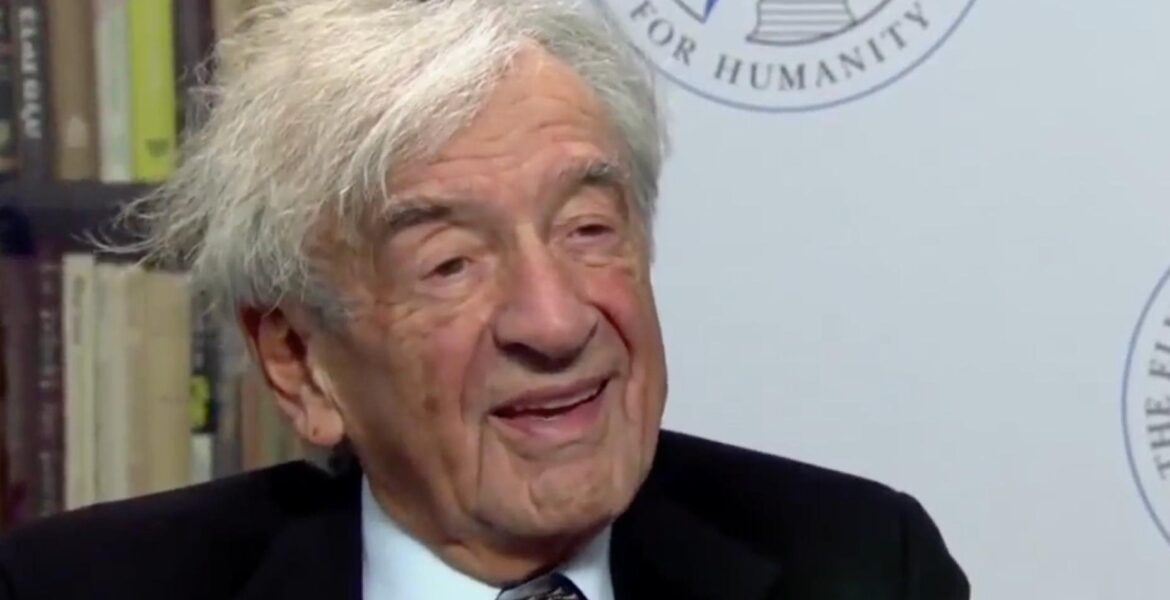For nearly 30 years I had wanted to sit down and have a conversation with Elie Wiesel.
I finally got my opportunity in 2013, on the eve of the 20th anniversary of the U.S. Holocaust Memorial Museum.
The world knows Elie Wiesel as the Holocaust survivor who won The Nobel Peace Prize for being what the Nobel committee called “a messenger to mankind.”
While his life after The Night has been driven by communicating and keeping alive the memories of the Nazi campaign to exterminate the Jewish People – there is so much more to Elie Wiesel. The teacher. The student. The reader. The friend.
Hours before our interview, which you can watch below in its entirety or in shorter segments, I was having coffee with a former professional violinist who has found his calling as a psychologist and performance coach who teaches at the Juilliard School of Music. His name is Noa Kageyama.
I told Noa I was nervous about this interview with Professor Wiesel. Not because of who I was interviewing. But because I’d waited so long and we had so little time. A half hour for 30 years of questions.
I asked Kageyama – who coaches musicians and athletes on how to maximize their performance — what I could do to address these nerves – to maximize my performance in what I considered the interview of a lifetime.
He told me to imagine myself on a plane, returning home, after a hugely successful interview with Professor Wiesel. Imagine the feeling. Then, he said, imagine specifically what made the interview so great.
I did what he said.
You can watch the result, the entire 32 minutes, on the first video link below. Or you can choose any of the shorter segments farther down on topics ranging from how humor survives in a survivor to how a son stayed alive in Auschwitz for the sake of his father.
These videos contain my questions and Elie Wiesel’s answers — which lead to more questions – which I dream of asking another day.
A FATHER & SON IN AUSCHWITZ
At the very moment I write these words, my son is downstairs studying for his Bar Mitzvah. He is chanting, with a teacher, the very same prayers Eliezer Wiesel chanted for his Bar Mitzvah 71 years ago.
Two years after Wiesel’s Bar Mitzvah, he and his father arrived at the Auschwitz death camp.
They survived a selection process presided over by Josef Mengele.
Father and son survived Auschwitz together.
Father and son survived the brutal transfer to Buchenwald together.
Shortly before American troops arrived to liberate Buchenwald, the father could survive no longer. As Wiesel describes in this 3 minutes 58 seconds excerpt from our conversation, father and son lived for each other.
Long enough for the son to deliver his testimony.
Long enough to continue his role as a “messenger to mankind” to this very day, while, downstairs, a son prepares to carry on a tradition that will survive.
THE NEWSDAD QUESTION
When are our children ready to learn about the worst acts human beings have ever committed.
We parents struggle with this question.
Here, I ask Elie what so many parents have asked him through the years. What age is the right age to first read his Holocaust memoir Night?
This 45 seconds is Elie Wiesel’s guide for parents.
BREAKING NEWS FROM THE HOLOCAUST
There is still breaking news from The Holocaust. Perhaps that should not surprise us given how thoroughly the Nazis themselves documented their genocide of the Jews. Here, in a 1 minute 50 seconds excerpt of our conversation, I ask Elie Wiesel about the news recently uncovered by researchers with the U.S. Holocaust Memorial Museum in Washington. They discovered that there were 45-thousand more Jewish Ghettos and Concentration Camps than we’d previously known.
HOW HUMOR SURVIVES
The last thing I expected when I first went to an Elie Wiesel lecture was humor. But he delivered. Ever since that first time I heard Elie Wiesel deliver a joke flawlessly — one relevant to the Biblical theme he was addressing — I’ve wanted to ask him this: How did your humor survive what you survived? In this 1 minute 47 seconds, he gives me his answer.
WHO CAN WE TRUST?
All through our lives we ask ourselves who we can trust. Sometimes we make the wrong judgment — we trust people we should not. Or we fail to trust people whom we should trust. When Elie Wiesel was a boy, he developed a trusting relationship with a man named Moishe. Wiesel’s instincts were right. But when Moishe was forced to leave town, and returned with a horrific story about what was happening to the Jews of Europe, the people of Elie Wiesel’s town did not trust Moishe. They thought he was crazy. In the next 1 minute and 49 seconds, Elie Wiesel remembers Moishe.
THE SURVIVING PHOTO
One photo of Elie Wiesel in Buchenwald survives, which you will see in this short excerpt. It was taken by an American soldier who helped liberate the death camp. Wiesel was only 16. In this brief excerpt from our conversation, which appeared on CNN, Wiesel, who is now 84, speaks to the 16 year-old survivor inside of him.

